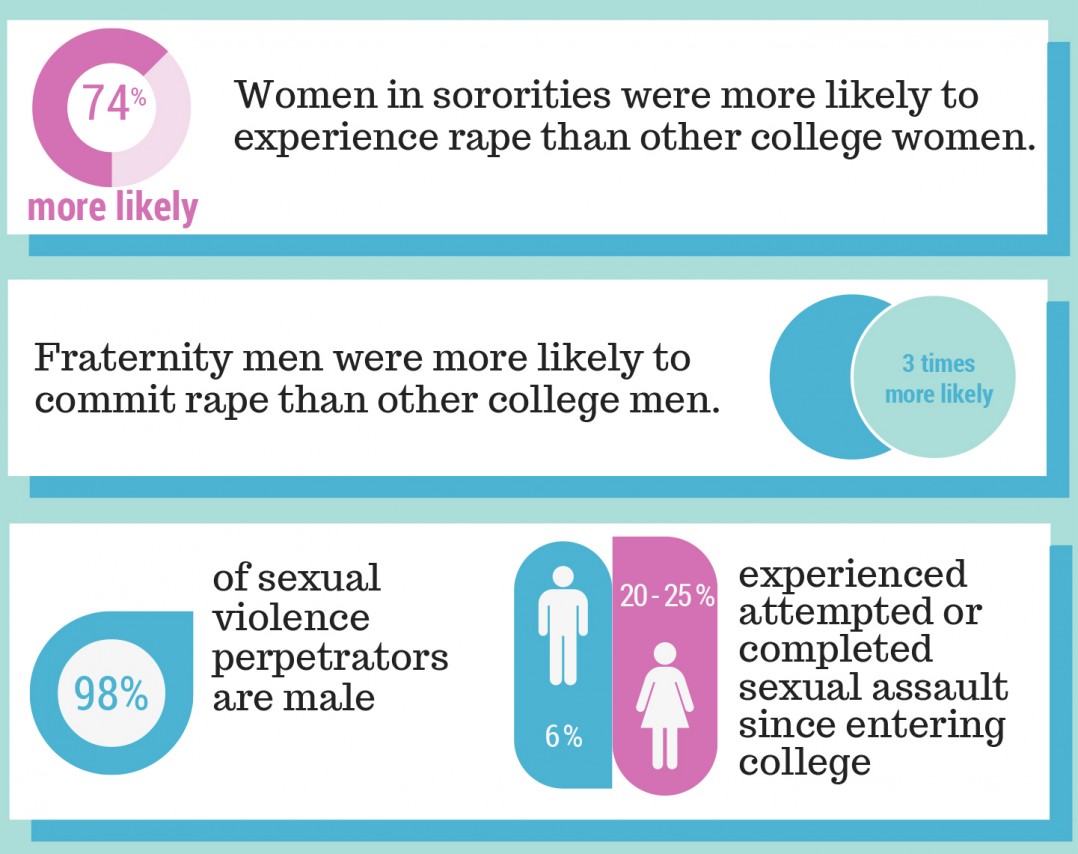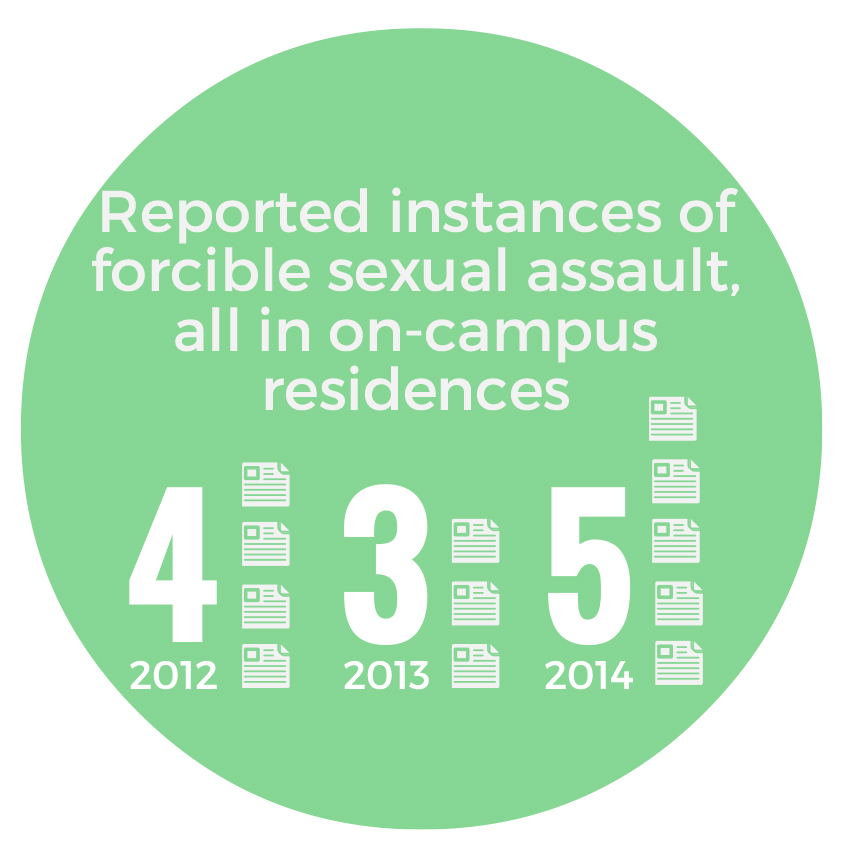Author’s note: This article contains graphic language, as well as extensive discussion of sexual assault and rape.
Nested among the emails bloating the inboxes of Phi Kappa Tau fraternity members at the Georgia Institute of Technology lay one with a particularly brazen title: “Luring your rapebait.”
It was just past the onset of autumn in 2013, and the email’s author had decided to coach his fellow fraternity brothers on how to “succeed at parties.”
The corresponding message offered a how-to guide — complete with detailed, step-by-step instructions — for engaging in sexual activity with the aid of alcohol, The Atlanta Journal-Constitution reported. One paragraph described how to make small talk with women at parties. The next discussed how to get them to dance. And the next outlined how, exactly, to optimize dance floor encounters for the brothers’ pleasure.
The concluding paragraph summarized the “seven E’s of hooking up”: “Encounter, engage, escalate, erection, excavate, ejaculate and ‘expunge: send them out of your room and on their way out when you are finished.’”
The email’s prescribed remedy for any failure along the way was simple: “Go get more alcohol.”
Capped with a complimentary close of “in luring rapebait” and later acquired by university administrators, the message led to the sender’s prompt suspension from Phi Kappa Tau and the chapter’s ensuing disbandment in March of 2014.
So unfolded one in a recent series of fraternity members’ alleged sexual misconduct. Such allegations have, in turn, given rise to a widespread conversation about the candor and future of the social Greek system.
More recently, Brown University announced Jan. 19 that its fraternity chapters of Phi Kappa Psi and Sigma Chi had been sanctioned for hosting unregistered parties. At one such party, two students reported drinking punch laced with a date-rape drug, according to the Associated Press. The Pennsylvania State University’s chapter of Kappa Delta Rho fraternity was suspended March 16 after members were found to have posted evidence of hazing, as well as photos of nude and unconscious women, to a secret Facebook page, the university’s student newspaper stated. And North Carolina State University’s chapter of Pi Kappa Phi fraternity was placed on interim suspension March 20 due to the apparent discovery of a chapter pledge book filled with racially and sexually charged entries.
“If she’s hot enough, she doesn’t need a pulse,” one read, according to CBS-affiliated news station WRAL.
The occurrences appear to reflect a broader trend. A study led by researchers at The College of William and Mary and published in a 2007 peer-reviewed NASPA journal found that fraternity men were three times more likely to commit rape than other college men. In 2013, another NASPA journal featured a study by researchers at Oklahoma State University, which indicated that women in sororities were 74 percent more likely to experience rape than other college women.
The findings supplement a 2007 study by the U.S. Department of Justice, which found that overall, between one in four and one in five college women and one in 16 college men experienced attempted or completed sexual assault since entering college.
The decision to report
In spite of the quantitative evidence of sexual assault and rape on college campuses, however, a significantly small proportion of such crimes are typically reported to authorities.
“I believe they’re definitely the No. 1 most underreported crimes on campus — on any college campus,” Ed Shupp, the Lehigh University Police Department chief, said.
Indeed, a 2000 report by the Department of Justice found that less than five percent of rapes or attempted rapes of college students were reported to campus authorities or law enforcement.
According to crime statistics released by the LUPD, there have been just a handful of reported instances of forcible sexual assault, all in on-campus residences, in the past few years: five in 2014, three in 2013 and four in 2012. There were no reported cases of non-forcible sexual assault during any of the three years, as well as only three total reported cases of anonymous sexual assault.
Chris Mulvihill, the assistant dean of student conduct, said about half of those involved Greek-affiliated students.
However, Brooke DeSipio, the director of Lehigh’s Office of Gender Violence Education and Support, said the numbers do not reflect each “contact” the university receives — instances where a survivor comes forward to seek help — but rather the official amount of reports that meet Clery Act reporting requirements.
Shupp said he believes some victims may be deterred from reporting because they fear dismissal, disbelief or “social suicide.” But DeSipio said underreporting is principally bolstered by our culture’s tendency to blame victims.
“Rape and sexual assault are the only crimes where the victims are not de facto presumed innocent,” DeSipio said. “So, if someone comes forward and says, ‘I was robbed,’ the first questions aren’t, ‘Well, what were you wearing? Were you wearing an expensive suit? Did you have a designer handbag?’ ‘Oh, really? You were asking to be robbed.’ But when victims of sexual assault come forward, the questions we ask are, ‘Well, what were you wearing? How much did you have to drink?’”
Historically, DeSipio said, the legal and university systems have embraced policies of what is often known as “double rape” or “double victimization” when investigating claims of sexual assault and rape. During such processes, the burden of proof is placed on the victim rather than the accused.
“Prior to the 1970s…it was really on the victim to prove they were raped,” DeSipio said. “They had to prove they fought off, they had to have witnesses hearing them say, ‘No,’ they had to have skin under their fingernails. The (investigative) process has since changed, but the perception hasn’t caught up. So people are still afraid that when they come forward…it’s going to be a really difficult process for them.”
Sexual misconduct among Lehigh Greeks
The Phi Kappa Tau “rapebait” email was hardly the first of its kind. Nor was it the last.
On the evening of Nov. 16, 2014, the phones of 39 potential incoming Lehigh Delta Phi fraternity members hummed and glowed, heralding the arrival of a new text message.
“You’ll soon find out that this week is literally the greatest week here at school,” read the text, referring to the university’s notoriously revelry-packed Lehigh-Lafayette week. “We got mad bbqs, pregames and parties this week, including tonight.”
But the message elaborated on its proposed festivities with explicit detail.
“We got the cum dum(p)sters of Pi (Beta) Phi (sorority) trying (to) fill up their daily load, so if you wanna bust on the face of a low-life Pi Phi piggy, then come tonight,” it continued. “Let’s (get) fucking destroyed.”
Sent by one of the organization’s elected officials and obtained through a source who wished to remain anonymous, the “degrading and demeaning” text led to Delta Phi’s deferred dissolution on Jan. 27. Additional charges involving hazing and alcohol later resulted in the chapter’s complete dissolution on Feb. 21, effective through Feb. 21, 2019.
A former Delta Phi leadership representative who requested that his name be withheld said the text message was the result of an individual member’s poor decision — one that was not supported by other members of the chapter.
“The person who sent the text message out obviously used very poor judgment,” the representative said. “He’s friends with a lot of girls in Pi (Beta) Phi (sorority), and I don’t know what sent him to do it.”
According to the representative, as soon as Delta Phi’s chapter leadership found out about the text message, it removed the offending member from his position and placed him on suspension within the fraternity. Ultimately, the member’s chapter affiliation was revoked, and he did not receive alumni status.
While the instance was met with serious repercussions and much pointed acrimony, some argued that it was a mere fragment of a bigger picture.
“I actually kind of felt bad for (Delta Phi),” said Pi Beta Phi member Audrey Baer, ’17. “They obviously shouldn’t have written the text…and it sucked to know that fraternities are saying that kind of stuff about sororities. But I know it hasn’t been the only text like that. I’m sure tons of social texts are very vulgar, so it sucks that they were the ones who got caught.”
DeSipio said Greek life, along with athletic teams and other organizations, is conducive to creating a strong “peer norm culture,” which can, in turn, lead to “rape culture,” or the concept that sexual assault is normalized due to societal attitudes regarding gender. In a peer norm culture, group members either continue with behaviors or change them based on peer feedback.
“If you join a group where, when you recount forcefully having sex with an incapacitated person to your peers, they’re high-fiving you…that reinforces that that is not rape or sexual assault, but rather a good thing to do,” DeSipio said. “But if they say, ‘Uh, that’s not cool, that’s not in line with our values,’ the peer culture challenges that behavior.”
Ryan Newcomer, ’15, the Interfraternity Council president and a member of Phi Sigma Kappa fraternity, said the supposed rape culture in many fraternities stems from recruitment processes that use women as a primary tool.
“If you join a house that held (those kinds of activities) during recruitment, you’re likely going to join that house thinking, ‘I’m entitled to women,’” Newcomer said. “And then, all of a sudden, you get really drunk at a party, and there’s a woman who doesn’t want you. But you still think, ‘I’m entitled to this woman.’ That’s not how it should be, obviously.”
Newcomer also said the IFC has recently cracked down on measures against such recruitment events, including “anything but clothes” parties, “anything for money” parties and visits to strip clubs.
According to Colin Orr, ’15, a member of Delta Chi fraternity and the IFC communications chair, the very structure of fraternity parties often adds fuel to entitlement and power dynamics. Most Lehigh Greek chapters schedule parties for four nights each week, and as a national rule, sororities are not allowed to host parties within their own chapter houses.
As a result, fraternities supply both the location and alcohol.
“For some fraternity men, there’s almost the expectation that, ‘We’re providing the alcohol, now you guys have to show up and have a good time,’” Orr said.
The Brown and White reached out to the presidents of all 17 IFC fraternities for comment in two separate emails over a two-week time frame. Four responded.
President of Delta Upsilon Ricky Johnson, ’16; President of Alpha Epsilon Pi Jonathan Cohen, ’15 ; President of Chi Psi Garrett Pan, ’16; and President of Phi Delta Theta Greg Potter, ’16, all said sexual assault and rape are not exclusive to Greek life. But Johnson, Cohen and Potter noted that the often alcohol-ridden social culture of the Greek system elevates their likelihood.
Cohen noted that a diminished focus on both aggressive drinking and an imbalanced gender ratio would likely reduce the risk of sexual assault and rape at fraternity parties.
Similarly, a study published in a 1996 edition of the peer-reviewed journal Gender and Society showed that skewed gender ratios at social events were a staple of “high-risk (Greek) houses.” But some Lehigh fraternities continue to encourage heavy intoxication and impose entry quotas at parties, particularly for first-year male students. In such cases, a man is required to bring a certain number of women with him to be admitted.
According to Mulvihill, alcohol has played a role in most recent Lehigh cases of sexual assault or rape, and its resulting uncertainties make investigations especially difficult. DeSipio said this ambiguity often leads to an investigative focus upon who initiated the sexual contact — for instance, if one person handed the other drinks all night or asked to take them home.
Because of this, and paired with The White House Council on Women and Girls’ assertion that about 98 percent of sexual violence perpetrators are male, some fraternity members are wary of the dangers of sexual activity when both partners are incapacitated.
“Be aware of what you’re doing, and don’t put yourself in a circumstance where you could get charged,” Johnson said. “It’s tough to judge these sorts of things, and there are definitely vicious people out there that commit atrocities…but even if you don’t have bad intentions, if anything gets reported, it can turn your life upside down.”
Beyond that, Newcomer said some Lehigh fraternities have a stereotypically greater propensity for rape than others. But as both Pan and Baer stated, only a few members of those supposedly shadier fraternities are likely responsible for such reputations.
In a similar vein, a 2002 study published in the peer-reviewed journal Violence and Victims found that a small percentage of men commit a large percentage of rapes. The findings, DeSipio said, highlight that joining a fraternity does not inherently make a man a rapist.
As Orr said, fraternity men are not always the only ones promoting alcohol consumption or sexual activity. Indeed, a junior sorority member who requested that her name and chapter name be withheld said there exists a culture among some sorority women that — whether directly or subliminally — idealizes going out, “being fun,” “having a good time” and, ultimately, hooking up.
Pan said a dearth of bystander intervention in social settings is another major enabler for nonconsensual sexual activity.
“I think it’s disgusting,” said Dani Joy, ’17, a member of Kappa Alpha Theta sorority. “People should be able to realize when they (themselves) or others are getting too drunk to make good choices, and they should stop anything from happening.”
Long-term solutions
Among the merits of Greek affiliation cited by fraternity and sorority members include friendship, networking opportunities, philanthropy involvement and the acquisition of leadership skills. But in light of reports surrounding Greek students’ alleged misconduct — either sexual or otherwise – some institutions have suggested abolishing their respective Greek systems.
Dartmouth College’s student newspaper reported Nov. 5 that faculty members voted 116-13 to dismantle the campus’s Greek system, which partly inspired the infamous 1978 film “Animal House.” The university has since banned hard liquor on its campus and forbidden pledging within Greek organizations.
And in the wake of a sensationally graphic, yet later retracted, November 2014 Rolling Stone article detailing a fraternity gang rape, the University of Virginia suspended all fraternities and associated parties until the following semester. Even when the suspension was lifted, sororities were directed to refrain from participating in major fraternity functions.
Skepticism about Greek life and its associated practices has not evaded South Mountain. A 2008 Greek perception survey by Lehigh’s Office of Fraternity and Sorority Affairs showed that 63.5 percent of all respondents — or 88.2 percent of Greek students, 47.7 percent of non-Greek students, 28.6 percent of faculty and 58.4 percent of staff — had a positive perception of Greek life at Lehigh.
But a majority of respondents also said areas of concern for the Greek system were hazing, alcohol abuse and drug abuse. Forty-two percent of Greeks, 72 percent of non-Greeks and 88 percent of faculty, moreover, also believed that women’s safety was an issue within the Greek community.
Still, the university has not considered eliminating its Greek system, Vice Provost John Smeaton said.
“Greek life done well can be an asset to campus life, and Greek life done poorly has no future at Lehigh,” Smeaton said in an email in regard to the university’s Strengthening Greek Life effort.
As Tim Wilkinson, the director of the OFSA, said in an email, processes such as Strengthening Greek Life and the Next Steps initiatives aim to continuously assess and improve the health of Lehigh’s Greek community.
DeSipio, furthermore, said abolishing Greek organizations would not offer a truly effective solution to sexual assault or rape. Kicking an entire group off campus, she said, would not eradicate greater cultural messages — but encouraging students against having incapacitated sex or “slut shaming” would help.
“There are amazing things that fraternities and sororities offer,” Cohen said in an email. “But because they have the ability to create such positive change, they should be held to a higher degree of accountability and be active in preventing negative experiences — not just for their members, but within the community in which they operate, by being safe spaces for all.”







Comment policy
Comments posted to The Brown and White website are reviewed by a moderator before being approved. Incendiary speech or harassing language, including comments targeted at individuals, may be deemed unacceptable and not published. Spam and other soliciting will also be declined.
The Brown and White also reserves the right to not publish entirely anonymous comments.